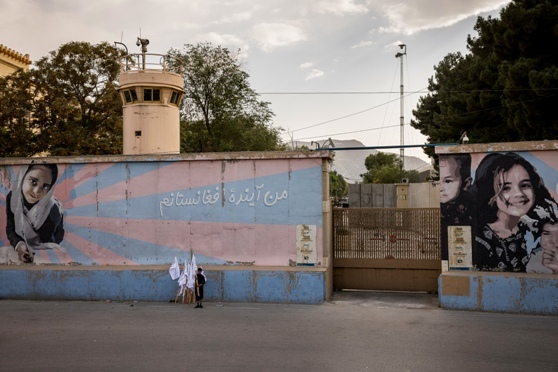Blinken says American diplomats have left Kabul

By Lara Jakes
WASHINGTON — American diplomats have left Afghanistan, and the US Embassy in Kabul will remain closed, Secretary of State Antony Blinken said on Monday (30) after the military announced that it had completed its withdrawal from the country.
The disintegration of US diplomacy was a stunning turnabout from plans to stay and help Afghanistan transition away from 20 years of war and work toward peace, however tenuous, with a government that would share power with the Taliban. Earlier this month, Blinken had pledged that the United States would remain “deeply engaged” in Afghanistan long after the military left.
But with the Taliban firmly in control of Afghanistan, what was one of the largest US diplomatic missions in the world will for now be greatly scaled back, based in Doha, the Qatari capital, and focused largely on processing visas for refugees and other immigrants.
“Given the uncertain security environment and political situation in Afghanistan, it was the prudent step to take,” Blinken said in remarks at the State Department.
He sought to portray the departure as a “new chapter of America’s engagement with Afghanistan.”
“It’s one in which we will lead with our diplomacy,” Blinken said, commending the US diplomats, troops and other personnel who had worked at the embassy, which just last month had employed around 4,000 people — including 1,400 Americans.
Left uncertain was whether American efforts to stabilize the Afghan government would continue — the main thrust of years of painstaking work and negotiations with leaders in Kabul that were supported by billions of dollars in US taxpayer funding.
Instead, Blinken said any engagement with the Taliban — a longtime US enemy that seized power when President Ashraf Ghani fled Afghanistan on Aug. 15 — “will be driven by one thing only: our vital national interests.”
Exactly four weeks earlier, on Aug. 2, Blinken left little doubt that the Biden administration intended to keep the US Embassy in Kabul open.
“Our partnership with the people of Afghanistan will endure long after our service members have departed,” he said then. “We will keep engaging intensely in diplomacy to advance negotiations between the Afghan government and the Taliban with the goal of a political solution, which we believe is the only path to lasting peace.”
As many as 200 American citizens, and tens of thousands of Afghans, were left behind in a two-week military airlift that Blinken called one of the largest evacuation efforts in US history. He demanded that the Taliban keep its word and allow them to safely leave once they have exit documents in hand.
He also said the United States would closely watch the Taliban’s efforts to stanch terrorism in Afghanistan, as it has said it will do, and continue to work with the international community to provide humanitarian aid to millions of Afghans who need food, medicine and health care after decades of war and political instability.
More than 123,000 people were evacuated from Kabul in recent weeks, including about 6,000 Americans.
Sen. Jeanne Shaheen, D-NH, said it was “paramount” that the United States remain engaged with Afghanistan, adding in a statement that she had long worried that a premature US military withdrawal would unravel 20 years of work to build a stable government in Kabul.
“Our mission in Afghanistan has ended,” Shaheen said, “but our commitment to protect the American people, safeguard US national security and maintain our global stability endures.”
It was a depressing coda for hundreds of American diplomats who had served at the US Embassy since December 2001, when a handful of Foreign Service officers accompanied US Marines who reclaimed the embassy compound from Taliban control. The embassy building itself had largely sat empty since 1989, when the Soviet military withdrew from Afghanistan after a 10-year war, and American diplomats were evacuated for protection.
The diplomatic mission’s staffing levels ballooned during a so-called civilian surge that coincided with an increase in military troops that began in 2010. The embassy compound in Kabul later expanded, with hundreds of millions of dollars in additional office space, employee apartments, fortified gates and blast walls over 15 acres.
From Doha, the new American mission will be led by Ian J. McCary, a career diplomat with 26 years at the State Department who had served as the embassy’s deputy chief of mission since last year.
For years, American diplomats have held peace talks with the Taliban in Qatar, where the extremist group opened a political office years ago to establish relations with the broader international community. Additionally, the US military is firmly ensconced at Al Udeid Air Base outside Doha, which is being used now as a way station for tens of thousands of Afghans who have been evacuated.
By relocating to Doha, American diplomats will be able to keep a close eye on their two overriding priorities in Afghanistan: processing refugees and trying to keep the Taliban in check.
Both could prove to overwhelm a diplomatic system already under strain from having to revamp one of the most storied US missions of a generation after being caught flat-footed.
Blinken struck a resolute tone about the diplomatic retreat, and in reminding Americans about the cost of war.
“America’s work in Afghanistan continues,” he said, adding that the State Department was moving forward with plans to regroup.
America’s longest war, with its casualties and the resources that were sunk into it over the past 20 years, “demands reflection,” Blinken said.
“We must learn its lessons, and allow those lessons to shape how we think about fundamental questions of national security and foreign policy,” he said. “We owe that to future diplomats, policymakers, military leaders, service members. We owe that to the American people.”
-New York Times

